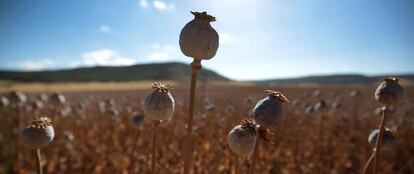Death among Spain’s poppy fields
The second-biggest producer of opium in the world, the country keeps its drug business under the radar


A medical examiner recalls a pastoral scene, with the body lying in a sea of strange green pods swaying in the wind. The corpse belonged to Pasquale, a 32-year-old Italian who dodged the heavy police surveillance to enter the poppy fields with two friends in search of a high. The examiner also photographed the coarse but effective tools he had used to cut off the pods and extract the latex – the white sticky juice that contains the opium.
Spain, the world’s second biggest opium producer
- In the 2015-2016 season, Spain has planted 13,000 hectares of opium, according to data from the Agriculture Ministry.
- It's an expanding crop – during the last season there were only 8,000 hectares.
- Only Australia has planted more poppies than Spain.
- The poppy fields are in Castilla-La Mancha, Castilla y León, La Rioja and the Basque Country. Their exact location is classified.
Few people realize that Spain is the second-biggest poppy producer in the world, growing as much as 13,000 hectares a year. Only Australia accounts for more. And though the legal opium business is expanding due to rising global demand for painkillers, it remains shrouded in secrecy. In Spain, just one government-approved company controls the entire production process – from sowing to exporting the final product. The clandestine nature of the business is such that the location of the fields must be kept under wraps while high security is essential. If a farmer wants to plant opium for the company, they have to get permission to do so from the Agriculture Ministry.
Even Pasquale’s death didn’t shatter the silence. He died in the afternoon on June 25, 2009. According to police reports, he started to suffer convulsions and stopped breathing. His two friends came running out of the field onto the road and alerted a passerby, who told the police. The medical examiner established that it was an accidental death caused by ingesting opium. Pasquale was an addict and, according to his friends, also an epileptic. A judge in Albacete opened a preliminary investigation, the results of which were filed four months later. Nobody except for his closest friends and family knew about his foray into the poppy field.
In fact, the matter would never have been brought to light if it weren’t for forensic toxicologist, María Antonia Martínez who took an interest in the case that eventually made its way to her desk at Madrid’s Toxicology Institute in 2009. Now, seven years later, the magazine Forensic Science International has published an article on Pasquale’s death; the incident was unusual, being the first death to occur in a legal opium field in Europe. “Our work sparked a lot of interest at the last forensic conference in Florida,” says Martínez.
A growing but little-known business
In the last 20 years, global consumption of opioids – opium-based painkillers – has tripled. Currently, around 92% of morphine is consumed by countries where just 17% of the world’s population lives – mainly, America, Canada, Western Europe, Australia and New Zealand, according to the last report from the International Narcotics Control Board. Around 5.5 billion people still have either limited or no access to drugs containing morphine or codeine, the report adds.
As much as 27% of the world’s morphine and 18% of its thebaine comes out of the Alcaliber factory in Toledo, according to their webpage. Currently, they export 93% of the drugs to 67 countries.
This relatively unknown low-profile company has 24-hour surveillance on its fields and factories, including remote monitoring to ensure “the system is impenetrable.” EL PAÍS visited one of its accessible fields in Castilla y León. The police asked that we keep the province a secret.
“With this type of crop, there are no signposts; it would just draw attention to it,” says one police source. “In some cases they put up a perimeter plastic fence but the scale is so big. You can’t close the countryside off. On the positive side, this means the fields are not close to paths.”
The farmer in charge of the field visited by EL PAÍS explained that opium is no different from any other crop. “You plant it in March and harvest in July or at the start of August, depending on where you are. The fields have to be irrigated. In many respects, it’s like any other cereal crop. It’s no more work. We plant it and the rest is done by the company.”
The scarcity of such cases in the West contrasts starkly with countries such as Afghanistan and Iran, where opium is grown illegally and where intoxication and accidental death are frequent. In fact, intoxication is one of the most common causes of children being hospitalized in Pakistan.
The report in Forensic Science International refers to just one other case in the 1980s when a number of youngsters stole poppy capsules in Denmark, using them to make tea. The result was one death.
In the case of Pasquale, Martínez and two other colleagues, Salomé Ballesteros and Elena Almarza, performed new tests on the forensic samples that had been stored at the time. According to the report, they detected thebaine, morphine and codeine, which are found naturally in opium. But they also found traces of other drugs, namely cocaine, cannabis and ethyl alcohol. The cause of death was a cocktail of drugs with morphine and the very toxic thebaine playing a major role.
Every now and again, mostly in the south of the country, people try to break into these legal poppy fields to get the latex from the poppies. The trespassers are often French or Italian and they camp close to the fields or even inside them. In 2013, the Toledo judiciary sentenced two Italians to almost two years behind bars for extracting opium from poppies in the town of Polán. They also awarded damages to the company growing the poppies.
“Nowadays the process is mechanized,” says Martínez. “They harvest the poppies when the pod is dry. It is then processed to extract the alkaloids they use to make drugs such as morphine and codeine. The method used in the case we researched [that of Pasquale] was the traditional method still used in some parts of the world – you make cuts so that the latex seeps out. As it dries, it darkens and becomes what is known as opium.”
World leader
While Australia produces 19,500 hectares of poppies rich in morphine, Spain grows poppies with a higher thebaine content, which is used in a number of analgesics. The last report from the International Narcotics Control Board (INCB), notes Spain’s stake in this crop, whose acreage has grown by 62.5% in the past year.
All the countries that have signed the UN agreement on drugs are bound to report on poppy production so that none goes astray. In Spain, the sector is controlled exclusively by Alcaliber, which, according to its website, is the biggest producer of morphine in the world. The company got government approval in 1973. From its headquarters in Colón, Madrid, its employees declined to comment for this report. Alcaliber is part of the Torreal group owned by investor Juan Abelló, with links to the pharmaceutical company Sanofi Aventis. In 2014, they made a profit of €7 million.
This culture of silence extends to Spain’s Health Ministry, which authorizes the cultivation of poppies. All that can be gleaned from their transparency portal is that there are currently 536 growers and their crops can be found in Andalusia, Castilla-La Mancha, Castilla y León and the Basque Country. Though the exact location of the fields is not revealed, it is known that there is heavy police surveillance – mainly the Civil Guard – which also controls vulnerable sections of the population and provides escorts for the transportation of the harvested poppies and raw materials. It also guards “officially protected deposits,” about which the government refuses to comment.
Sign up for our newsletter
EL PAÍS English Edition has launched a weekly newsletter. Sign up today to receive a selection of our best stories in your inbox every Saturday morning. For full details about how to subscribe, click here
English version by Heather Galloway.
Tu suscripción se está usando en otro dispositivo
¿Quieres añadir otro usuario a tu suscripción?
Si continúas leyendo en este dispositivo, no se podrá leer en el otro.
FlechaTu suscripción se está usando en otro dispositivo y solo puedes acceder a EL PAÍS desde un dispositivo a la vez.
Si quieres compartir tu cuenta, cambia tu suscripción a la modalidad Premium, así podrás añadir otro usuario. Cada uno accederá con su propia cuenta de email, lo que os permitirá personalizar vuestra experiencia en EL PAÍS.
¿Tienes una suscripción de empresa? Accede aquí para contratar más cuentas.
En el caso de no saber quién está usando tu cuenta, te recomendamos cambiar tu contraseña aquí.
Si decides continuar compartiendo tu cuenta, este mensaje se mostrará en tu dispositivo y en el de la otra persona que está usando tu cuenta de forma indefinida, afectando a tu experiencia de lectura. Puedes consultar aquí los términos y condiciones de la suscripción digital.








































